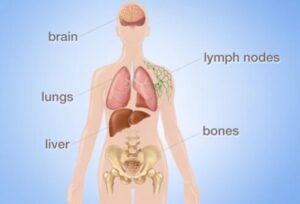Breast cancer (BRCA) is a highly heterogeneous systemic disease.
Breast cancers can relapse and metastasize to multiple organs.
Metastatic Breast Cancer (mBRCA) is cancer that has spread (metastasized) to other organs.
An estimated 168,000 women in the United States are living with metastatic breast cancer.
Nearly 30% of women initially diagnosed with early-stage breast cancer will ultimately develop metastatic breast cancer.
Approximately 85% of patients diagnosed with metastatic breast cancer have had an early-stage breast cancer diagnosis. However, most patients with early-stage breast cancer do. not go on to develop metastatic disease.
Some women may live for 10 years or longer with metastatic breast cancer
Approximately 15% of patients with metastatic breast cancer are found to have metastatic spread at the time of the initial breast cancer diagnosis. This is called de novo metastatic breast cancer.
Over half of advanced breast cancers metastasize to the bone.
Recent studies have revealed that breast cancer subtypes differ not only in primary tumor characteristics but also in their metastatic behavior.
- Luminal type breast cancers commonly metastasize to the bone.
- Her2neu breast cancers commonly metastasize to the liver
- Her2neu has been associated with increased metastasis and invasiveness.
- Triple-negative breast cancers are predisposed to lung and brain metastases.
- Triple-positive breast cancer (TPBC) , positive for receptors for Estrogen, Progesterone and can metastasize to bone, lungs, brain and liver.
Metastatic breast cancer symptoms can vary based on the location of metastatic lesion
- General: Profound fatigue or malaise, loss of well being, unexplained weight loss, difficulty with urination or bowel movements
- Lungs – Dry cough, hoarse voice, shortness of breath and difficulty breathing
- Liver – Jaundice, nausea, pain or swelling in the belly, change in bowel habits, loss of appetite and itchy skin or rash
- Brain – Blurred vision, dizziness, headaches, loss of balance, frequent nausea or vomiting, confusion and memory problems, change in speech or handwriting, seizures, mood and behavior changes
- Bones – Swelling, bone fractures and back, neck, bone or joint pain
Teach patients to listen to their body and to report symptoms that persist for more than 5 days. Patients are usually the first to notice when something is not right.
Many oncologists do not monitor the tumor microenvironment, or the “cancer terrain”. In integrative oncology we assess the whole biosystem that may host cancer development and progression.
Screening for metastatic progression includes:
Radiology scans: Bone Scan, CT, PET, PET-CT, MRI
Blood tests, including
- BRCA Tumor markers: CEA, CA 15-3. CA 27.29
- Cell free tumor DNA (liquid biopsy)
- Biomarkers of cancer metabolism reflective of the tumor microenvironment including,but not limited to
- Inflammation: CRP, IL-1, IL-6, IL-8, ceruloplasmin, ferritin, sedimentation rate (ESR)
- Hypercoagulation: fibrinogen, d-dimer
- Growth, Progression and Metastastis: VEGF, TGFb, FGF, IGF-1, Her2neu, copper, ceruloplasmin
Breast cancer survivors who have been in remission or those who are living with breast cancer as a chronic illness must be followed closely and screened for disease progression by their care teams over the long term. This team may include be primary care, gynecologist, surgeon, radiologist, medical oncologist and integrative care providers.
Patients must be educated about the importance of ongoing screening and monitoring and keeping their appointments
Because of the typical age demographic for BRCA patients, there are commonly co-morbid conditions.
The OutSmart Cancer® is a whole person, whole health system. We advise patients to receive ongoing health monitoring along with disease monitoring including assessment for
- Healthy weight
- Healthy Body Composition: Bone Mass, Muscle Mass, Fat Mass
- Healthy Cognitive Function
- Cardiovascular Health
- Immune Health and Inflammation Control
- Joint and Musculoskeletal Health and Mobility
- Neurological Health and Function
- Emotional and Psychological Health
- Digestive, Intestinal and Microbiome Health
- Healthy Sleep Cycle
- Healthy Stress and Life Management
- Support System: Community, Family
- Activities of Daily Living
- Healthy Dietary Patterns: Follow OutSmart Cancer® Dietary Guidelines
- Healthy Endocrine Function
- Healthy Glycemic Control
- Vitamin, Mineral, Macro and Micro-nutrient status
- Monitor and Manage Nutriceutical, Botanical and Phytochemical supplementation
- Monitor Lifestyle factors that influence risk and promote health
In order for health and healthy function to be our outcome, there must be a plan for creating and sustaining health over the long term.
There is an explosion of BRCA research and promising advancements and deeper understanding that is continually developing.
Metastatic BRCA must be monitored and can be managed and treated. Best outcomes result from combining the best of modern oncology and integrative health focused screening and care.
Selected References


